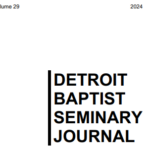The Role of Seminary in the Spiritual Formation of Students
What is the role of the seminary in the spiritual formation, as it now called, the spiritual growth and maturity of the seminary student? Carl Trueman begins the discussion in this post in which he says:
This is a real challenge for theological educators as it is one area where seminaries cannot go very far in meeting the need. Indeed, I find the whole notion of ‘spiritual formation’ within seminaries to be somewhat problematic: seminaries impart knowledge and skills which are essential for ministry and which cannot be acquired with like ease in a practical mentoring situation; they also provide a context for developing important and useful friendships which will last a lifetime; but they cannot really engage in spiritual formation in any deep way. Certainly, the professor can and should strive to model Christian behaviour; but the real, deep, lasting spiritual formation for ministerial candidates takes place in a church context just as it does for every other Christian. The church is where the word is preached, the sacraments administered and discipling takes place.
To address the issue of character, seminaries need to work with local churches; and students need to understand the limits of a seminary education. It is work in the local church, where the word is preached, the Lord’s Supper administered and discipling implemented, that forms true Christian character. An MDiv, or equivalent, is just a technical accomplishment. Read the right books, learn the right things, and you can pass the test.
Michael Haykin expresses some disagreement with Trueman:
One of the classic introductions to theological studies is B.B. Warfield’s The Religious Life of Theological Students, where his primary concern is to argue for the necessity of personal piety in the life of those studying at a theological seminary. He expects that the seminary be a place of piety, where piety is inculcated and where the students experience what we call today “spiritual formation.”
Trueman responds to Haykin, arguing that he and Haykin are not really that far apart. Sean Lucas enters the discussion with what he sees as an additional problem:
One of the major tensions in theological education over the years has been whether seminaries are graduate theological schools or whether they are training centers for ministers and those who serve beside them. That tension is especially acute at schools where PhD programs take up a significant portion of faculty load and those students make up a large part of the student body. Even when seminary faculty view the PhD program as an extension of ministerial training, because the PhD is oriented toward the academic guild, the overarching ethos of the seminary tends to move away from ministerial training toward professional knowledge.
Trueman responds to Lucas with a rather straightforward rejection:
I believe this to be an unwarranted (and, indeed, given its dependence upon the nebulous and rather subjective concept of ‘ethos,’ both unverifiable and unfalsifiable) generalized claim which presupposes the broad incompatibility, or at least the normative separability and opposition of agendas, of academic research and piety.
If you are interested, you should read the entire discussion. I find myself in general agreement with each of the perspectives. It is primarily a question of emphasis, I believe.


